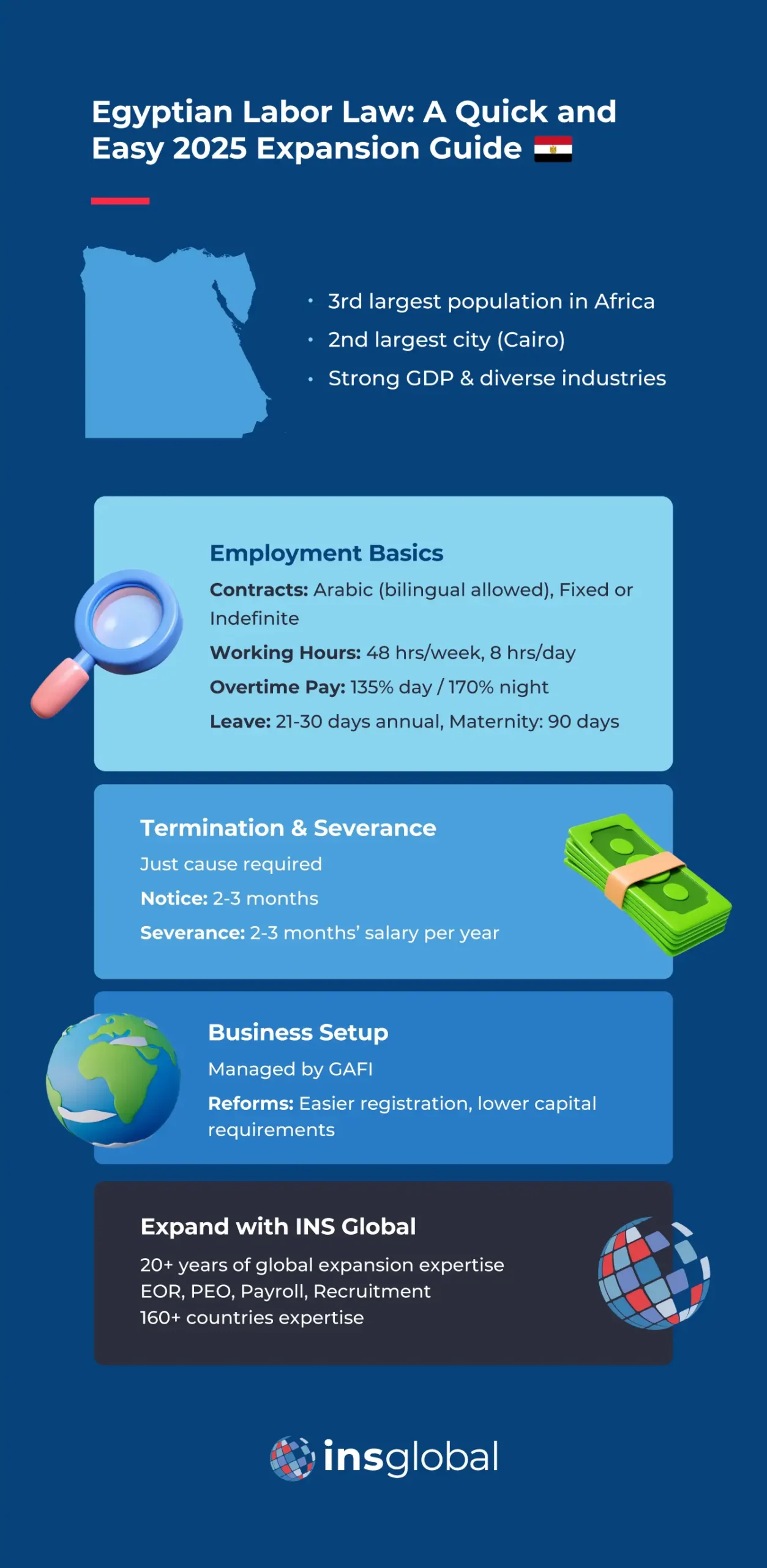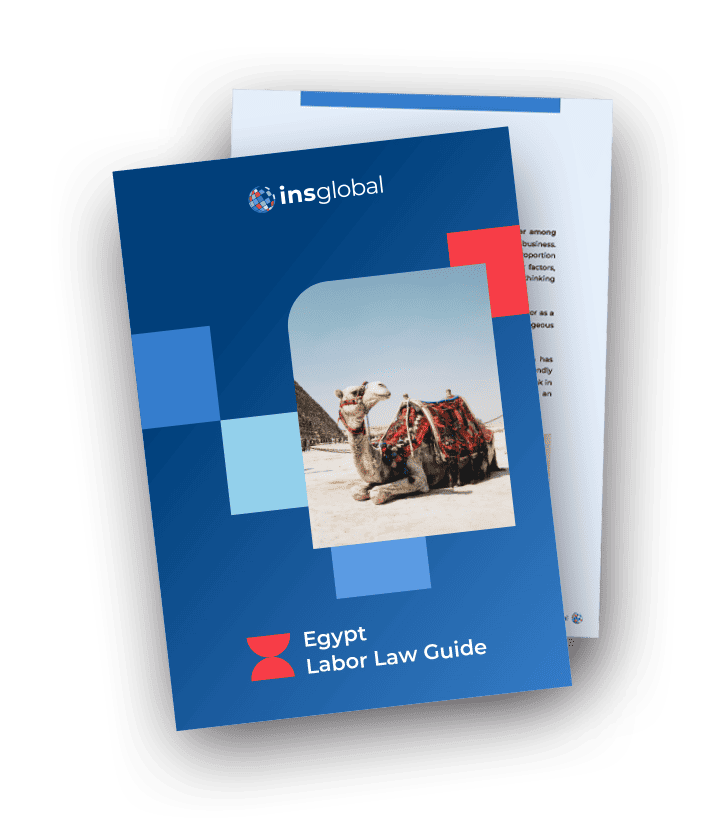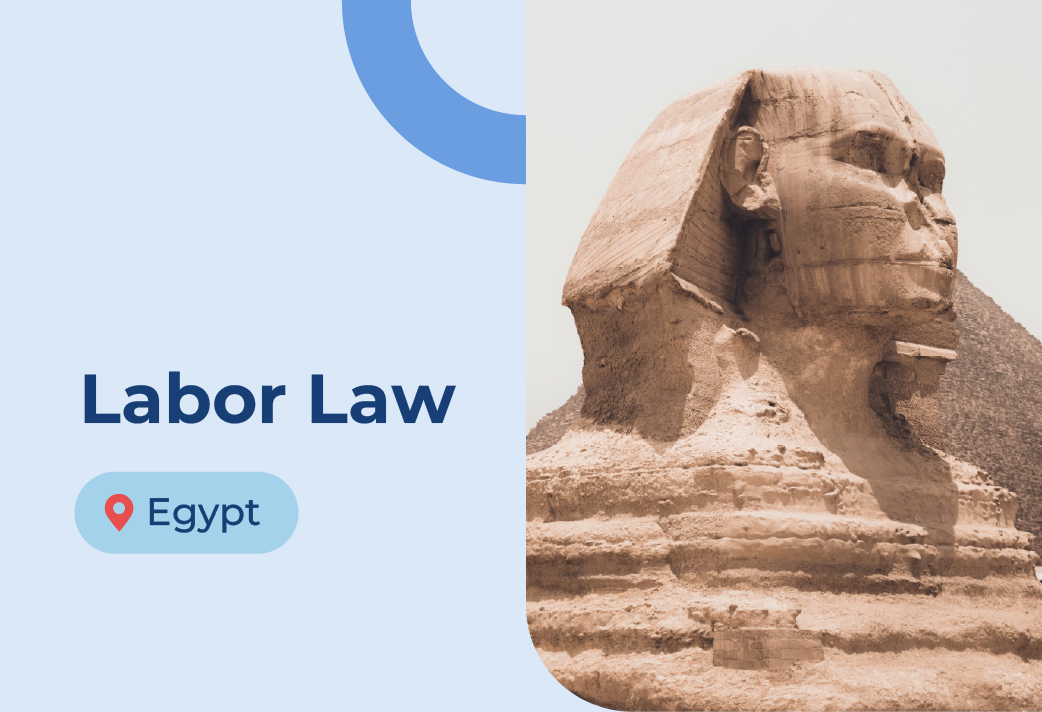Deciding on international expansion is a vital step for many companies, and in 2024, Egypt appeals to many as the perfect market for growth and opportunity. However, knowing how to expand efficiently and effectively and being able to navigate the complexities of Egyptian labor law remain key issues for responsible employers.
Egypt, with the 3rd largest national population and the 2nd largest city in Africa, stands as a key target for foreign investors. Its mixed economy, blending socialism and capitalism, boasts one of Africa’s highest GDPs. Diverse sectors include tourism, petroleum, textiles, agriculture, manufacturing, construction, and telecoms.
Egyptian labor law and company law combines contemporary norms with Islamic Sharia law, featuring a hierarchical court system and independent judges. Ongoing changes aim to enhance openness, efficiency, and investor trust. Initiatives like “Egypt Vision 2030” and the “New Investment Law” signify efforts to promote innovation, competition, and diversity.
Despite being an emerging market, Egypt offers opportunities amid the challenges of a diverse environment. That’s why we’ve put together this short guide to Egyptian labor law for employers, so you can familiarize yourself with the biggest concerns and requirements when expanding to Egypt.

Tired of scrolling? Download a PDF version for easier offline reading and sharing with coworkers
Egyptian Labor Law Regulations
The main piece of legislation outlining labor relations in Egyptian Labor Law 12, 2003 (as amended by Law 180 of 2008). This defines how employers and employees interact in Egypt’s private sector.
Egyptian Labor Law governs all the standard conditions of employment, like working hours, breaks, overtime pay, and other working conditions, as described in detail below.
Job protections and benefits are governed by Social Security Law 79/1975 and the Civil Law Code.
Employment Contracts in Egypt
Employment contracts, governed by Egyptian Labor Law, must be in Arabic, with bilingual versions allowed. The contract details include employer and workplace information, contract duration, employee details, job description, wages, and employee benefits.
Contract types include indefinite and fixed-term agreements, the latter lasting up to 5 years and subject to extension.

Probation in Egypt
Probation periods are limited to 3 months.
Independent Contractors
In Egypt, independent contractors are self-employed individuals working for multiple clients without being part of the client’s management.
A formal contractor agreement outlines duties and compensation. Contractors manage their taxes and social security, receiving no benefits or employer contributions. Employment laws don’t cover contractors, treating the relationship as a business agreement.
Foreign contractors may face visa challenges, as the current system does not provide many routes for foreign freelancers to live and work in Egypt without the support of a company entity.
Misclassifying contractors as employees can lead to penalties, including compensating for lost benefits, economic fines, and potential criminal charges. Proper treatment of workers is crucial to avoid falling fouling of Egyptian labor law practices.
Check Our Egypt Labor Law Guide
Learn how the Egypt law is applied in all aspects and situations, from an employer and employee perspective.

Working Hours and Overtime in Egypt
Under Egyptian Labor Law, the maximum weekly working hours are 48, with a daily limit of 8 hours. Women and minors (14 to 18) cannot work between 7 PM and 7 AM, and daily working hours, inclusive of overtime, are capped at 10 hours for all workers.
All employees are entitled to a minimum 1-hour break, starting no later than five hours into the workday, with one day of rest for every six continuous workdays.
Overtime in Egypt
Overtime pay is applicable for those exceeding standard weekly hours, with rates not falling below 135% for daytime and 170% for nighttime hours, as specified in the employment contract.
Types of Leave in Egypt
Public Holidays
In Egypt, national holidays include:
- Coptic Christmas Day
- Revolution and National Police Day
- Sham El-Nessim
- Eid Al-Fitr
- Sinai Liberation Day
- Labor Day
- Eid Al-Adha
- June 30 Revolution
- Islamic New Year
- July 23 Revolution Day
- Prophet Muhammad’s Birthday
- Armed Forces Day
Islamic holidays vary annually due to the lunar calendar.
Employees working on national holidays receive 300% of their standard daily salary.
Annual Leave and Sick Leave in Egypt
Annual leave ranges from 21 to 30 days based on service and age, with additional leave for those in remote or hazardous environments.
Sick leave provides workers with 75-85% pay for up to 180 days.
Female employees are entitled to 2 periods of 90-day paid maternity leave in Egypt, and employers must grant nursing breaks. Discussions are ongoing regarding potential paternity leave for male employees.
Termination and Severance in Egypt
In the case of contract termination, the employee’s work contract serves as the most important legal document for outlining the terms and obligations of employees and employers.
Under Egyptian labor law, employees cannot be terminated without just cause, including offenses like professional incompetence, safety violations, extended absences from work, and more. Termination without cause usually warrants compensation and notice if challenged successfully in a labor court.
Notice periods range from 2 to 3 months, with the possibility of wages in lieu.
Severance and redundancy pay include a minimum of 2 months’ salary per year of employment, increasing to 3 months after 10 years, along with payment in lieu of notice and compensation for unused vacation.
Establishing a Legal Entity in Egypt
Establishing a legal entity in Egypt is known to be difficult, with the country last ranking 114th globally on the Ease of Doing Business Scale, but the system has become more accessible in recent years thanks to work on reforms.
The General Authority for Investment and Free Zones (GAFI) manages company registration processes which are now available online. Recent reforms got rid of or reduced capital requirements, particularly benefiting small businesses. “One-Stop Shops” further simplify procedures, and the government aims to attract foreign investment by offering benefits like making it easier to take profit out of the country.
Investment restrictions apply to specific industries, and visas, including business, work, and residency, have varying requirements.
Common company types range from One-Person Companies to Joint-Stock Companies and Limited Liability Companies.

Why Choose INS Global as Your HR Services Provider When Expanding to Egypt?
With nearly 20 years of experience in international business development, INS Global is perfectly placed to aid you in your expansion to Egypt and over 100 other countries worldwide. By offering expert resources and advice, INS Global ensures your business operations and employees, both local and international, remain compliant throughout the move to Egypt.
We facilitate secure business processes, handle Egyptian Labor Law compliance challenges through our Employer of Record and PEO in Egypt, payroll, and recruitment services, and offer in-depth local support through local expertise and resources. Our extensive global network supports businesses of all sizes, so by relying on INS Global’s easy one-stop solutions, our clients can focus on their core business aspects while we handle the complexities of expansion success and streamlining.
Contact our expert global expansion advisors for a free consultation today to explore new opportunities and boost your international expansion efforts.
At the same time, you can access our range of labor law guides here, including a longer version of this guide to Egyptian Labor Law.

SHARE